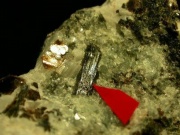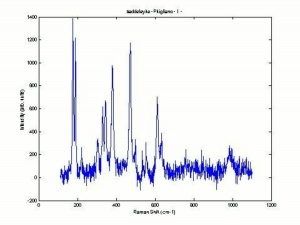Difference between revisions of "Zirconium"
Jump to navigation
Jump to search
| (One intermediate revision by one other user not shown) | |||
| Line 3: | Line 3: | ||
A soft white metallic element. Zirconium occurs naturally in the minerals [[zircon]], malacon, baddeleyite, zirkelite, eudialyte, and some rare earth minerals. Its abundance in the earth's crust in 0.023%. Zirconium was discovered by Martin Klaproth in 1789 and first isolated as a metal by Jöns Jacob Berzelius in 1824. Because zirconium has good strength and is resistant to heat, corrosion, and nuclear radiation damage, it is widely used in nuclear reactors. It is also used in lamp filaments and flash bulbs. In the ceramic industry, [[zirconium silicate]] and [[zirconium oxide]] are used as [[opacifier|opacifiers]] and [[frit|glaze frits]]. | A soft white metallic element. Zirconium occurs naturally in the minerals [[zircon]], malacon, baddeleyite, zirkelite, eudialyte, and some rare earth minerals. Its abundance in the earth's crust in 0.023%. Zirconium was discovered by Martin Klaproth in 1789 and first isolated as a metal by Jöns Jacob Berzelius in 1824. Because zirconium has good strength and is resistant to heat, corrosion, and nuclear radiation damage, it is widely used in nuclear reactors. It is also used in lamp filaments and flash bulbs. In the ceramic industry, [[zirconium silicate]] and [[zirconium oxide]] are used as [[opacifier|opacifiers]] and [[frit|glaze frits]]. | ||
| − | |||
[[File:zirconiumkes.jpg|thumb|Zirconium]] | [[File:zirconiumkes.jpg|thumb|Zirconium]] | ||
| − | + | [[[SliderGallery rightalign|baddeleyiteitaly1.jpg~Raman]]] | |
== Synonyms and Related Terms == | == Synonyms and Related Terms == | ||
Zr; zirconio (It.); zircônio (Port.); circonio (Esp.); Zirkonium (Deut., Ned., Sven.); cyrkon (Pol.) | Zr; zirconio (It.); zircônio (Port.); circonio (Esp.); Zirkonium (Deut., Ned., Sven.); cyrkon (Pol.) | ||
| − | + | == Risks == | |
| − | + | * Handling may cause irritation. | |
| + | * Fisher Scientific: [https://fscimage.fishersci.com/msds/99099.htm MSDS] | ||
| − | + | == Physical and Chemical Properties == | |
| − | Reacts with hydrofluoric acid, aqua regia, hot phosphoric acid and fused alkalis. Not attacked by cold sulfuric acid, nitric acid or hydrochloric acid. | + | * Bluish black powder or soft white metallic flakes. |
| + | * Reacts with hydrofluoric acid, aqua regia, hot phosphoric acid and fused alkalis. | ||
| + | * Not attacked by cold sulfuric acid, nitric acid or hydrochloric acid. | ||
{| class="wikitable" | {| class="wikitable" | ||
| Line 30: | Line 32: | ||
|- | |- | ||
! scope="row"| Melting Point | ! scope="row"| Melting Point | ||
| − | | 1853 | + | | 1853 C |
|- | |- | ||
! scope="row"| Density | ! scope="row"| Density | ||
| − | | 6.44 | + | | 6.44 g/ml |
|- | |- | ||
! scope="row"| Molecular Weight | ! scope="row"| Molecular Weight | ||
| Line 42: | Line 44: | ||
|- | |- | ||
! scope="row"| Boiling Point | ! scope="row"| Boiling Point | ||
| − | | 4375 | + | | 4375 C |
|} | |} | ||
| − | == | + | ==Resources and Citations== |
| − | + | * Web Elements: [http://www.webelements.com/webelements/elements/text/Zr/key.html Website] | |
| − | |||
| − | |||
| − | |||
| − | |||
| − | |||
| − | Web Elements: [http://www.webelements.com/webelements/elements/text/Zr/key.html Website] | ||
| − | |||
| − | |||
* Cricket Harbeck, Adhesives Commonly used in Objects Conservation, unpublished, 1996 Comment: 'Ceramic Pigments' ''Industrial and Engineering Chemistry'', 30(7), 1938. | * Cricket Harbeck, Adhesives Commonly used in Objects Conservation, unpublished, 1996 Comment: 'Ceramic Pigments' ''Industrial and Engineering Chemistry'', 30(7), 1938. | ||
| − | * | + | * C. J. Harbeck, 'Ceramic Pigments' ''Industrial and Engineering Chemistry'', 30(7), 1938. |
* Richard S. Lewis, ''Hawley's Condensed Chemical Dictionary'', Van Nostrand Reinhold, New York, 10th ed., 1993 | * Richard S. Lewis, ''Hawley's Condensed Chemical Dictionary'', Van Nostrand Reinhold, New York, 10th ed., 1993 | ||
| Line 67: | Line 61: | ||
* ''The Merck Index'', Martha Windholz (ed.), Merck Research Labs, Rahway NJ, 10th edition, 1983 Comment: entry 10306 | * ''The Merck Index'', Martha Windholz (ed.), Merck Research Labs, Rahway NJ, 10th edition, 1983 Comment: entry 10306 | ||
| − | + | * Wikipedia: http://en.wikipedia.org/wiki/Zirconium (Accessed Sept. 20, 2005) | |
| − | |||
| − | * Wikipedia | ||
[[Category:Materials database]] | [[Category:Materials database]] | ||
Latest revision as of 12:12, 2 June 2022
Description
A soft white metallic element. Zirconium occurs naturally in the minerals Zircon, malacon, baddeleyite, zirkelite, eudialyte, and some rare earth minerals. Its abundance in the earth's crust in 0.023%. Zirconium was discovered by Martin Klaproth in 1789 and first isolated as a metal by Jöns Jacob Berzelius in 1824. Because zirconium has good strength and is resistant to heat, corrosion, and nuclear radiation damage, it is widely used in nuclear reactors. It is also used in lamp filaments and flash bulbs. In the ceramic industry, Zirconium silicate and Zirconium oxide are used as opacifiers and glaze frits.
Synonyms and Related Terms
Zr; zirconio (It.); zircônio (Port.); circonio (Esp.); Zirkonium (Deut., Ned., Sven.); cyrkon (Pol.)
Risks
- Handling may cause irritation.
- Fisher Scientific: MSDS
Physical and Chemical Properties
- Bluish black powder or soft white metallic flakes.
- Reacts with hydrofluoric acid, aqua regia, hot phosphoric acid and fused alkalis.
- Not attacked by cold sulfuric acid, nitric acid or hydrochloric acid.
| Composition | Zr |
|---|---|
| CAS | 7440-67-7 |
| Mohs Hardness | 5.0 |
| Melting Point | 1853 C |
| Density | 6.44 g/ml |
| Molecular Weight | atomic wt = 91.224 |
| Refractive Index | 2.2 |
| Boiling Point | 4375 C |
Resources and Citations
- Web Elements: Website
- Cricket Harbeck, Adhesives Commonly used in Objects Conservation, unpublished, 1996 Comment: 'Ceramic Pigments' Industrial and Engineering Chemistry, 30(7), 1938.
- C. J. Harbeck, 'Ceramic Pigments' Industrial and Engineering Chemistry, 30(7), 1938.
- Richard S. Lewis, Hawley's Condensed Chemical Dictionary, Van Nostrand Reinhold, New York, 10th ed., 1993
- Van Nostrand's Scientific Encyclopedia, Douglas M. Considine (ed.), Van Nostrand Reinhold, New York, 1976
- The Merck Index, Martha Windholz (ed.), Merck Research Labs, Rahway NJ, 10th edition, 1983 Comment: entry 10306
- Wikipedia: http://en.wikipedia.org/wiki/Zirconium (Accessed Sept. 20, 2005)


